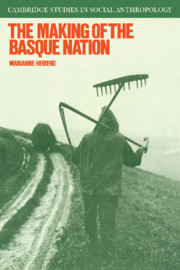Book contents
- Frontmatter
- Contents
- List of maps
- Preface
- Introduction: empire and the emergence of Spain
- Part 1 From plurality to Basque ethnic solidarity
- Part 2 Inside the moral community: the village of Elgeta, Guipúzcoa
- Postscript
- Conclusion: ethnic nationalists and patron–clients in Southern Europe
- Notes
- Biblography
- Index
- Cambridge Studies in Social Anthropology
Introduction: empire and the emergence of Spain
Published online by Cambridge University Press: 19 October 2009
- Frontmatter
- Contents
- List of maps
- Preface
- Introduction: empire and the emergence of Spain
- Part 1 From plurality to Basque ethnic solidarity
- Part 2 Inside the moral community: the village of Elgeta, Guipúzcoa
- Postscript
- Conclusion: ethnic nationalists and patron–clients in Southern Europe
- Notes
- Biblography
- Index
- Cambridge Studies in Social Anthropology
Summary
Spain, or rather, ‘the Spains in their pluralistic unity’ (Vicens Vives, 1970:32), was born out of the Reconquista (718–1611). She arose from an unstable alliance of independent Christian kingdoms stretching in a line from Galicia to Catalonia pushing southward against the Islamic invaders. The initial unifying idea behind Spain was that of Christian opposition to the Muslim threat. Unlike Navarra, Leon, Aragon and Catalonia, Castile was a product of the Reconquista. She had no prior separate political existence. Castile was part of the repopulated areas and her dominant classes consisted of Basques, Cantabrians, Aragonese and so forth. In short, Castile was an amalgam of the peripheral ethnic and regional groups over which Castile in turn attempted to assert authority.
Neither the Catholic kings (1469–1516) nor their descendants, the Habsburgs (1516–1700) tried to force a unified royal administration upon the Iberian peninsula. The Basque provinces, Navarra, Catalonia and Aragon maintained distinct legal codes (fueros) and autonomous political institutions. This disparate political arrangement was institutionalized in the Pacto Monárquico which granted formal recognition to and respect for the autonomy of the different regions under the Castillian Crown. Moreover, the Spanish regions were regarded as having a contractual rather than subordinate position to the central, royal authority.
Whereas Spain's political institutions gave substantial guarantees for regional autonomy, the degree of autonomy the regions actually exercised has been frequently exaggerated. Here the role of Spain's empire must be mentioned. Imperial expansion generated considerable social and political integration in Spain.
- Type
- Chapter
- Information
- The Making of the Basque Nation , pp. 1 - 8Publisher: Cambridge University PressPrint publication year: 1989



